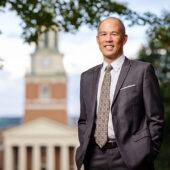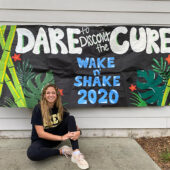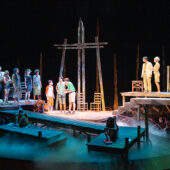Weathering the stormy job market
 Wake Forest's Vice President of Innovation and Personal and Career Development Andy Chan offers insights into the market for jobs and internships and suggests proactive ways grads can move forward.
Wake Forest's Vice President of Innovation and Personal and Career Development Andy Chan offers insights into the market for jobs and internships and suggests proactive ways grads can move forward.Categories: Personal & Career Development

 Hannah Scanlon, a junior mathematics major from Raleigh, N.C., has been named a 2020 Barry S. Goldwater Scholar. Scanlon was selected as one of 396 college students from across the U.S. and is one of 12 in North Carolina to receive the award for the 2020-21 academic year.
Hannah Scanlon, a junior mathematics major from Raleigh, N.C., has been named a 2020 Barry S. Goldwater Scholar. Scanlon was selected as one of 396 college students from across the U.S. and is one of 12 in North Carolina to receive the award for the 2020-21 academic year. Wake Forest University has been awarded the 2020 National Career Development Association’s (NCDA) Exemplary Career Center Program Award. The award recognizes a career center program for their commitment to thoughtful, innovative and effective initiatives that support career development.
Wake Forest University has been awarded the 2020 National Career Development Association’s (NCDA) Exemplary Career Center Program Award. The award recognizes a career center program for their commitment to thoughtful, innovative and effective initiatives that support career development. For this year’s Wake ‘N Shake, a 12-hour dance marathon organized by Wake Forest students, participants will join in from places across the country instead of gathering on campus.
For this year’s Wake ‘N Shake, a 12-hour dance marathon organized by Wake Forest students, participants will join in from places across the country instead of gathering on campus. Mentoring is all about relationships, and millions of college students are now working remotely from their professors. During this time of social distancing and “stay at home” directives, is there a way to keep connected? Yes.
Mentoring is all about relationships, and millions of college students are now working remotely from their professors. During this time of social distancing and “stay at home” directives, is there a way to keep connected? Yes. In a message sent to the Wake Forest University community today, President Nathan O. Hatch shared that the University will not resume in-person classes this spring. The University’s traditional Commencement ceremony this May has been postponed.
In a message sent to the Wake Forest University community today, President Nathan O. Hatch shared that the University will not resume in-person classes this spring. The University’s traditional Commencement ceremony this May has been postponed. Wake Forest students will lend a virtual hand to K-12 students who unexpectedly find themselves at home during the COVID-19 pandemic trying to learn subjects that may be giving them trouble. Any parent of a child in the Winston-Salem/Forsyth County Schools who wants a tutor can request one.
Wake Forest students will lend a virtual hand to K-12 students who unexpectedly find themselves at home during the COVID-19 pandemic trying to learn subjects that may be giving them trouble. Any parent of a child in the Winston-Salem/Forsyth County Schools who wants a tutor can request one.  When it comes to social distancing, using the word “weeks” rather than “months” is more likely to lead to compliance. Wake Forest Professor of Communication Ananda Mitra, an expert in new media technologies and social media trends, says this is true even if the length of time is the same.
When it comes to social distancing, using the word “weeks” rather than “months” is more likely to lead to compliance. Wake Forest Professor of Communication Ananda Mitra, an expert in new media technologies and social media trends, says this is true even if the length of time is the same. Wake Forest University will suspend in-person classes - including cancelling classes from March 16 through March 22 - and move to remote delivery of course instruction.
Wake Forest University will suspend in-person classes - including cancelling classes from March 16 through March 22 - and move to remote delivery of course instruction. The WFU Awards and Recognitions briefs celebrate milestones of faculty, staff and students at Wake Forest.
The WFU Awards and Recognitions briefs celebrate milestones of faculty, staff and students at Wake Forest.